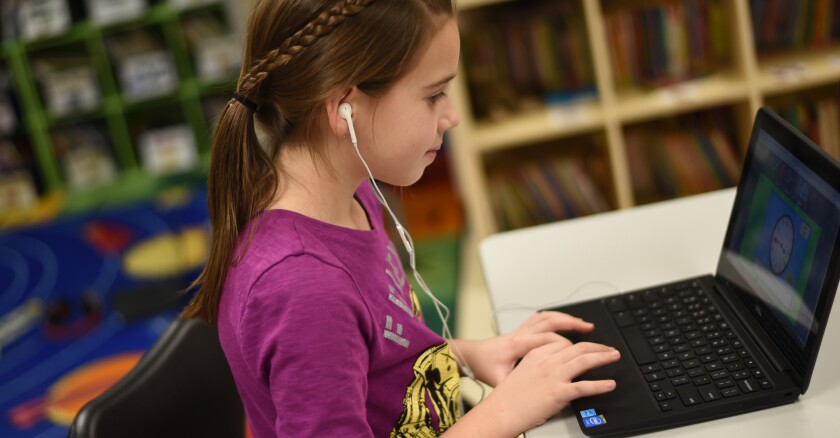The K-12 large district honorees with 12,000 or more students are Baltimore County Public Schools’ Students and Teachers Accessing Tomorrow: Growing Up Digital, Indiana’s Metropolitan School District’s Wayne Learning Hub, and Virginia’s Chesterfield County Public Schools’ (CCPS) Anytime, Anywhere Learning.
CCPS took a deliberate and thoughtful approach to adding devices to its classrooms. Rather than buying a lot of devices then wondering what to do with them, CCPS took three years to integrate online resources into its classrooms, including many Open Educational Resources, and train teachers in best practices for using these materials. After two years of being fully immersed in a digital environment, the district finally added Chromebooks for every student in middle and high school. CCPS is expanding its elementary devices in the fall.
“It’s not enough to bring technology and online resources to the classroom," said Brian Jones, CCPS executive director of technology. “You need to change the way the whole learning environment operates. Twenty-first-century learning means students are engaged in a more active process, with less sitting and listening. We want students to pull together information, demonstrate their knowledge in a variety of mediums and work together in groups.”
The medium district honorees with 3,000-12,000 students are North Carolina’s Mooresville Graded School District’s M-Powerment Strategiesand Ohio’s Pickerington Local School District’s Tradigital Learning. Tradigital Learning is a blend of the best practices of both traditional and digital education. The program launched in 2015 and will be fully implemented in three years. With Tradigital Learning, teachers act as guides who use technology to achieve personalized learning. The district abandoned textbooks in favor of digital content.
Digital equity is high on the priority list so all students have access to high-speed Internet during and after school. The district worked with the Chamber of Commerce to identify public businesses that would allow students to use their broadband after school hours, and it is currently working with T-Mobile to create a plan for using hot spots with any students that are still without Internet.
The district’s philosophy around technology is the same as its education philosophy, said Valerie Browning-Thompson, superintendent of Pickerington. “Provide every kid with what they need from where they are. We give them tools to be successful and improve student achievement by using technology to enhance our curriculum.”
The small district honorees of up to 3,000 students were Wisconsin’s Bridges Virtual Academy, New York’s Coxsackie-Athens Central School District’s Micro-Credentials and Digital Badges for Personalized Learning, and California’s Napa County’s Digital Early Literacy.
The preschool student population in California’s Napa County is 88 percent Spanish-speaking. When these children reach kindergarten, the achievement gap is two to three years, and that gap persists throughout their entire school career.
In 2010, Napa County Superintendent of Schools Barbara Nemko’s granddaughter, 2 years old at the time, discovered the app Footsteps2Brilliance. Watching the toddler focus on the app, Nemko knew she was on to something. Her granddaughter listened to stories on the app and would ask to listen over and over again. Nemko realized the app had the potential to give Napa's at-risk preschoolers the same early reading experience almost all middle- and higher-income students get at home.
The district began offering summer camps to pre-kindergarten children. It also provided kindergarten teachers, who were skeptical at first, a stipend to spend time learning the app. It didn’t take long for students and teachers alike to see the benefits of the app, which includes nursery rhymes and fables, as well as a huge teacher resource section. There was also an unexpected side effect — the Spanish-speaking parents of children using the app reported that their English improved right along with the skills of their children.
In 2014, the district decided it wasn’t enough for preschool students to have iPads at school, they needed them at home too. Through a grant from Napa Learns, a local partner, the district provides iPads for low or no cost to preschool families.
Nemko says the program has converted many digital skeptics, such as an older kindergarten teacher who came to observe a summer camp with her arms crossed and a scowl on her face. “Within an hour the hands came down and the scowl went away. If I had given her pompoms, she would have become a cheerleader,” said Nemko. "In all her years of teaching kindergarten, she had never seen anything like this.”








